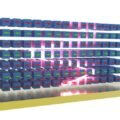The unwritten rules for beauty and style have changed since the beginning of the COVID-19 pandemic. With a nice shirt and sweatpants being the uniform of zoom meetings and fewer people going out in public, many have decided there’s no need to dress up to look good. Some have even vowed to never put as much effort into their appearance as they did before the global pandemic.
By far, the most significant impact on beauty and style has been the consistent addition of face masks. Women, specifically, no longer feel the need to wear makeup under their masks. Some also cite face masks as creating a negative trend on facial attractiveness, such as causing “maskne,” or acne caused by wearing a face covering for hours at a time.
Yet, new research published in Cognitive Research: Principles and Implications suggests that masks can make you look more attractive, depending on the type of mask worn.
Background: The Psychology of Attractiveness
Scientifically studying attractive qualities can be tricky because what people find appealing can be highly subjective, and the psychology of how we determine attractiveness is inconsistent.
Research, however, has found that typically individuals are considered more attractive when their facial features follow the rule of the golden ratio.
The golden ratio, a value of 1.6, results from dividing the length of the face by the width. Essentially, this means if a person’s face is 1:5 times longer than it is wide, they are typically viewed as being more attractive than those whose features fall outside the Golden Ratio.
Analysis: Face Masks and Attractiveness
Face masks can damage a person’s golden ratio, because they may make the face look wider or longer than it actually is. To study how face masks actually affect attractiveness, researchers from Cardiff University showed 43 female participants 40 different male faces. The participants were asked to rank the attractiveness of the face on a scale from one to 10. Some of the faces were not obscured, others wore a cloth mask, others wore a blue medical mask, and others were partially covered by a book.
The results of the study were surprising, as faces were ranked most attractive when wearing a blue medical mask. According to Dr. Michael Lewis, an expert in the psychology of faces and a Reader from Cardiff University’s School of Psychology: “This may be because we’re used to healthcare workers wearing blue masks and now, we associate these people in caring or medical professions. At a time when we feel vulnerable, we may find the wearing of medical masks reassuring and so feel more positive towards the wearer.”
Faces were also considered significantly more attractive when wearing any type of mask than not wearing one at all. “We also found faces are significantly more attractive when covered by cloth masks than when not covered,” added Lewis. “Some of this effect may be a result of being able to hide undesirable features in the lower part of the face-but this effect was present for both less attractive and more attractive people.”
Outlook: The Pandemic Has Shifted Attractiveness
The researchers performed similar studies before the pandemic and found opposite results. “The results run counter to the pre-pandemic research where it was thought masks made people think about disease and the person should be avoided,” Lewis said.
This new study shows the shift in people’s thinking due to the pandemic. Individuals no longer see a mask as a negative but as a positive. Lewis noted: “This relates to evolutionary psychology and why we select partners the way we do. Disease and evidence of disease can play a big role in mate selection-previously any cues to disease would be a big turnoff.”
Kenna Castleberry is a staff writer at the Debrief and the Science Communicator at JILA (a partnership between the University of Colorado Boulder and NIST). She focuses on deep tech, the metaverse, and quantum technology. You can find more of her work at her website: https://kennacastleberry.com/
